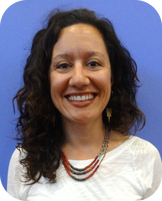A story that has always inspired me comes from Paraguay, South America, where students create their own musical instruments out of recycled materials from a landfill that receives over a ton of trash and recycled goods daily. Instruments are made out of old oil cans and discarded wood. This resulted in a beautiful group of children and adults who play their music in “The Recycled Orchestra”. Beautiful things can be created and emerge when we use our imaginations, and think “outside-the-box”.
What does your average day look like?
Providing direct occupational therapy interventions for students (ages 5-13) here in Oakland, offering alternatives to the team to promote endurance, coordination and regulation. It’s all about increasing daily participation in academic, leisure and self-care activities.
Why do you do this work?
Nothing is more rewarding than seeing students meet their academic and personal goals, whether it is participating in a game of 4-square at recess, completing an art project, tying their own shoelaces, or actively writing their own ideas down on paper. I get to engage students in activities that are motivating and fun using a multi-sensory approach; so sometimes students think we’re playing a game or making a craft for fun, but really these activities help them acquire new motor skills. It’s a joy to witness!
What hope do you have for the future of All-In?
I hope the Unconditional Education model continues to become available to many students in need, across widespread communities. We are so fortunate to have these providers and interventionists in the behavioral, academic, social-emotional strands. As the studies and research comes in to show the benefit of this model to children and families, I think similar implementations may become a reality in other school districts here in California and beyond.


 RSS Feed
RSS Feed